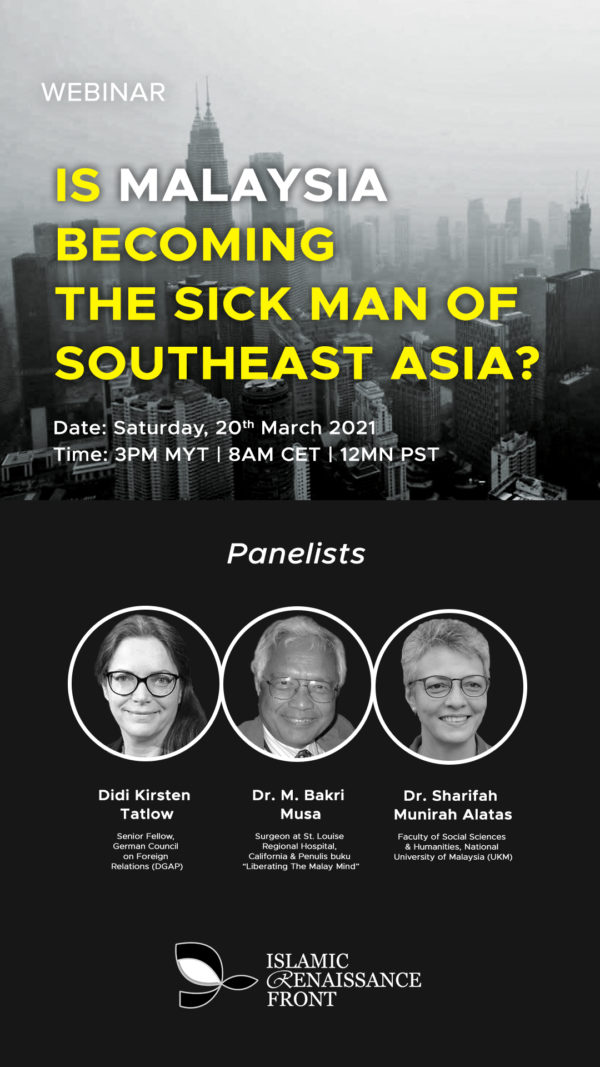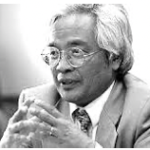
Date: Saturday, 20th March 2021
Time: 3PM MYT || 8AM CET || 12MN PST (19th March 2021)
Panelists:
1.Didi Kirsten Tatlow, Senior Fellow, German Council on Foreign Relations (DGAP)
2.Dr. M. Bakri Musa, Surgeon at St. Louse Regional Hospital, California & Author of “Liberating The Malay Mind”
3.Dr Sharifah Munirah Alatas, Faculty of Social Sciences & Humanities, National University of Malaysia (UKM)
Moderator:
Osman Softic, Islamic Renaissance Front
Jointly organised by:
Islamic Renaissance Front (IRF) & Forces of Renewal Southeast Asia (FORSEA)
Register at: https://www.eventbrite.com/e/webinar-is-malaysia-becoming-the-sick-man-of-southeast-asia-tickets-143685572415
The Zoom link will be sent on Friday 19th March 2021 to the registrants.
You are welcome to join the chat during the webinar. You can also send your questions in advance to [email protected]
The ‘sick man of Asia’ moniker was once used to describe the corruption and incompetence that characterised the China government under the Qing dynasty. The metaphor was later applied to the Philippines for its poor economic performance and unattractiveness to foreign investment under the Marcos dictatorial regime. With the nation now plagued by a shrinking economy, rising political instability and widening income inequality, is Malaysia on track to become the new ‘sick man of Southeast Asia’?
Foreign Direct Investment (FDI) figures are commonly used to gauge a country’s economic potential. As an emerging economy that is yet to attain developed country status, Malaysia still relies on foreign investment to spur economic growth. The United Nations Conference on Trade and Development (UNCTAD) recently revealed that FDI inflows to Malaysia in 2020 plunged by 68 % or more than two-thirds. This figure is alarming when compared to other Southeast Asian countries — such as Indonesia (-24 %), Singapore (-37 %), Thailand (-50 %) and the Philippines (+20%) — that have fared much better despite the onslaught of the COVID-19 pandemic. Indeed, in December 2020 itself, Malaysia’s Fitch Ratings, an indicator of economic health that investors often rely on, was downgraded from A- to BBB+. That is a big warning sign: Invest in Malaysia at your own peril!
Likewise, recent figures released by the Department of Statistics Malaysia (DOSM) paint a unflattering portrait of doom and gloom, with the country’s GDP shrinking by an overall 5.6% in 2020, the biggest contraction since the 1998 Asian financial crisis. DOSM also revealed that at the end of 2020, unemployment figures stood at 4.8%, the highest rate in three decades. It seems that the country’s key engines of growth are sputtering as they run out of steam; private investment, domestic consumption, government expenditures and exports are all floundering.
The darkening cloud of political uncertainty hovering over the country has dampened investor confidence significantly, constraining economic growth. The disgraceful loss of UMNO after reigning unchallenged for six decades until it became mired in the biggest financial scandal in history, the short lifespan of the ensuing Pakatan Harapan that eventually imploded after internal schisms, and the fickleness of the ruling Perikatan Nasional government of Tan Sri Muhyiddin that is surviving on artificial life support through a state of emergency declaration — all have sent tech giants such as Amazon, Google, Tesla, Panasonic, Toyota and Hyundai fleeing Malaysia for neighbouring Indonesia, the region’s largest economy, before the massive financial wounds they have suffered start to fester.
The great fall of Malaysia has exacerbated income inequality, despite an increase in median household income. A study conducted by the Khazanah Research Insitute (KRI) in 2018 showed that the absolute earnings gap between Malaysia’s top 20% versus the middle and bottom 40% has nearly doubled in the past two decades. This has dragged 43% of the country’s 6.9 million households into relative poverty (defined as earning less than 60% of the median income). Although 20% of government expenditure is allocated to education, the Malaysian workforce remains insufficiently skilled and educated to support a knowledge-based economy. Undoubtedly, the most important equaliser of income disparity is human capital. Until the education system is upgraded, many Malaysians will be stuck in low-paid jobs as they compete with low-skilled foreign workers. This is hardly the secret recipe to attract investment, trigger social mobility and ensure a more equitable distribution of wealth.
Once a confident roaring tiger, ailing Malaysia is now more of a distressed squeaking mouse that occasionally makes the headlines for all the wrong reasons. Should Malaysians then take comfort in the idea that all diseases have a cure and some nations that fell (such as The Philippines) did rise again? Obviously, that will depend on whether Malaysia’s sickness is a benign cold or a malignant cancer.
About the Speakers:
 Didi Kirsten Tatlow is currently a Senior Fellow at the Asia Program of the German Council on Foreign Relations (DGAP) in Berlin. Her work focuses on China, particularly its relations with Europe and technology transfer, as well as on China’s relations with Hong Kong and Taiwan. Tatlow is also a Senior Non-Resident Fellow at Projekt Sinopsis in Prague, Czech Republic. Tatlow worked as a journalist in Asia and Europe for 23 years, most recently as correspondent and columnist for the New York Times in Beijing from 2010 to 2017. Her articles focused on China, politics, society, gender, women’s and children’s rights issues, and Chinese-European relations. She is the editor and co-author of “China’s Quest for Foreign Technology: Beyond Espionage” (2020). Born and raised in Hong Kong, Tatlow holds a bachelor’s degree in Chinese and politics from the School of Oriental Studies, University of London.
Didi Kirsten Tatlow is currently a Senior Fellow at the Asia Program of the German Council on Foreign Relations (DGAP) in Berlin. Her work focuses on China, particularly its relations with Europe and technology transfer, as well as on China’s relations with Hong Kong and Taiwan. Tatlow is also a Senior Non-Resident Fellow at Projekt Sinopsis in Prague, Czech Republic. Tatlow worked as a journalist in Asia and Europe for 23 years, most recently as correspondent and columnist for the New York Times in Beijing from 2010 to 2017. Her articles focused on China, politics, society, gender, women’s and children’s rights issues, and Chinese-European relations. She is the editor and co-author of “China’s Quest for Foreign Technology: Beyond Espionage” (2020). Born and raised in Hong Kong, Tatlow holds a bachelor’s degree in Chinese and politics from the School of Oriental Studies, University of London.
 Dr. M. Bakri Musa is a Malaysian-born and Canadian-trained surgeon in private practice in Silicon Valley, California. He has given presentations on Malaysian affairs at Stanford University’s Shorenstein Asia-Pacific Research Center, The Woodrow Wilson International Center for Scholars, The University of Buffalo, and Rochester Institute of Technology. Apart from scientific articles in scholarly journals, his commentaries have appeared in mainstream Malaysian papers The New Straits Times and The Sun Daily. He was a long-time columnist for the on-line portal Malaysiakini (Malaysia Now) and a regular contributor to The Malaysian Insider. Beyond Malaysia, his Op-Ed pieces had appeared in The New York Times, International Herald Tribune, and The Far Eastern Economic Review. His commentary was also aired on National Public Radio’s “Marketplace.” Among his publications are The Malay Dilemma Revisited: Race Dynamics in Modern Malaysia (1999), Malaysia in the Era of Globalization (2002), An Education System Worthy of Malaysia (2003), “Seeing Malaysia My Way (2003), With Love, From Malaysia (2004), Moving Malaysia Forward (2008)Liberating The Malay Mind (2013) and hist latest book, The Plundering Of Malaysia: Najib Razak And The 1MDB Debacle (2020). He maintains a blog that also serves as a repository of my essays and commentaries at www.bakrimusa.com and is on Facebook.
Dr. M. Bakri Musa is a Malaysian-born and Canadian-trained surgeon in private practice in Silicon Valley, California. He has given presentations on Malaysian affairs at Stanford University’s Shorenstein Asia-Pacific Research Center, The Woodrow Wilson International Center for Scholars, The University of Buffalo, and Rochester Institute of Technology. Apart from scientific articles in scholarly journals, his commentaries have appeared in mainstream Malaysian papers The New Straits Times and The Sun Daily. He was a long-time columnist for the on-line portal Malaysiakini (Malaysia Now) and a regular contributor to The Malaysian Insider. Beyond Malaysia, his Op-Ed pieces had appeared in The New York Times, International Herald Tribune, and The Far Eastern Economic Review. His commentary was also aired on National Public Radio’s “Marketplace.” Among his publications are The Malay Dilemma Revisited: Race Dynamics in Modern Malaysia (1999), Malaysia in the Era of Globalization (2002), An Education System Worthy of Malaysia (2003), “Seeing Malaysia My Way (2003), With Love, From Malaysia (2004), Moving Malaysia Forward (2008)Liberating The Malay Mind (2013) and hist latest book, The Plundering Of Malaysia: Najib Razak And The 1MDB Debacle (2020). He maintains a blog that also serves as a repository of my essays and commentaries at www.bakrimusa.com and is on Facebook.
 Dr. Sharifah Munirah Alatas has a doctorate from Columbia University. Her specialities are geopolitics, strategic thought, and alternative approaches to International Relations Theory. She is interested in decolonising knowledge and discourses on Eurocentrism in knowledge production. Dr. Alatas also writes and speaks regularly on the politics of identity, education reform and social change in Malaysia. Currently an academic at the National University of Malaysia (UKM), her previous appointments include Director of Research and Publications, Institute of Diplomacy and Foreign Relations (IDFR, Malaysia), and Political Analyst, Institute of Strategic and International Studies (ISIS, Malaysia). Dr. Alatas is a regular columnist with Free Malaysia Today and the Islamabad Policy Research Institute. She is also a feature columnist for Astro Awani’s International Relations and World Politics section, and The Karyawan, a quarterly publication of Singapore’s Malay/Muslim community. Dr. Alatas is a life member of the Academic Movement of Malaysia (GERAK) and the Malaysian Social Science Association (PSSM).
Dr. Sharifah Munirah Alatas has a doctorate from Columbia University. Her specialities are geopolitics, strategic thought, and alternative approaches to International Relations Theory. She is interested in decolonising knowledge and discourses on Eurocentrism in knowledge production. Dr. Alatas also writes and speaks regularly on the politics of identity, education reform and social change in Malaysia. Currently an academic at the National University of Malaysia (UKM), her previous appointments include Director of Research and Publications, Institute of Diplomacy and Foreign Relations (IDFR, Malaysia), and Political Analyst, Institute of Strategic and International Studies (ISIS, Malaysia). Dr. Alatas is a regular columnist with Free Malaysia Today and the Islamabad Policy Research Institute. She is also a feature columnist for Astro Awani’s International Relations and World Politics section, and The Karyawan, a quarterly publication of Singapore’s Malay/Muslim community. Dr. Alatas is a life member of the Academic Movement of Malaysia (GERAK) and the Malaysian Social Science Association (PSSM).
Program:
300-310PM: Introduction by the Moderator, Osman Softic, Senior Research Fellow, Islamic Renaissance Front
310-340PM: Presentation by Didi Kirsten Tatlow, Senior Fellow, German Council on Foreign Relations (DGAP)
340-410PM: Presentation by Dr. M. Bakri Musa, Surgeon at St. Louse Regional Hospital, California & Author of “Liberating The Malay Mind”
410-440PM: Dr Sharifah Munirah Alatas, Faculty of Social Sciences & Humanities, National University of Malaysia (UKM)
440-520PM: Discussion
520-530PM: Concluding remarks by the Moderator, Osman Softic

